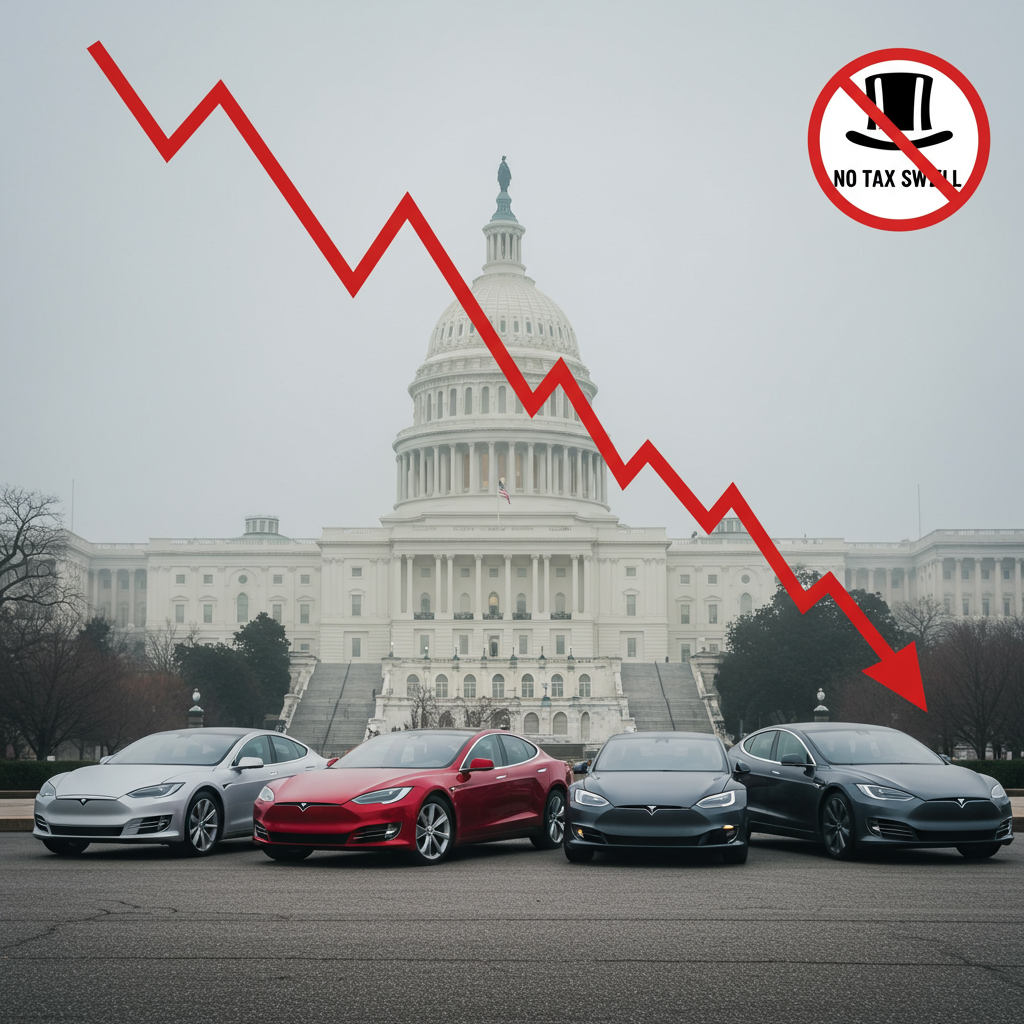tesla, the global electric vehicle powerhouse, recently announced a significant drop in its worldwide vehicle deliveries. This marks the second straight quarter the company has seen sales decline. The news comes at a pivotal moment for the entire EV industry, coinciding with legislative moves in Washington D.C. that could potentially eliminate a major incentive for buyers: the federal EV tax credit. This combination of factors creates a challenging outlook for Tesla and casts a shadow over the broader shift towards electric mobility.
Tesla’s Delivery Slide Continues
The latest figures confirm a persistent downturn in Tesla’s global sales performance. In the second quarter, the company reported delivering 384,122 vehicles. This represents a notable 13.5% decrease compared to the 443,956 vehicles sold in the same period the previous year. This Q2 performance follows a similar pattern seen earlier in 2025. Tesla’s first-quarter report had already signaled difficulties, showing a substantial 71% year-over-year decline in profits. This profit drop was directly linked to a 13% fall in EV deliveries during that quarter. The company had acknowledged facing increased competition at the start of the year.
Beyond standard market competition, however, many analysts and investors are pointing to additional factors influencing Tesla’s recent struggles.
The Political Dimension: How Musk’s Actions May Impact Tesla
Some market watchers believe that the difficulties Tesla has encountered are partly connected to CEO Elon Musk’s highly visible activities outside the company. His involvement with the U.S. government during the early part of President Donald Trump’s second term has drawn particular attention. During this time, Musk reportedly oversaw government layoffs and budget cuts as part of a ‘Department of Government Efficiency’ project. This role was perceived by some as potentially distracting or even detrimental to the Tesla brand image.
Elon Musk offered a different perspective in a May interview. He contended that Tesla’s global sales remained strong, identifying Europe as the sole exception and its “weakest market.” Controversially, he also suggested that while Tesla “lost some sales from the left,” it “gained some from the right.”
However, analysts see new complications stemming from Musk’s recent public disagreements with President Trump. These clashes escalated particularly around a proposed new tax and spending bill. This legislation, noted by analysts for potentially increasing the national debt significantly, includes a specific provision targeting the popular $7,500 tax credit for electric vehicle purchases. The Senate recently passed this bill by a narrow margin, sending it to the House of Representatives for final consideration.
Musk has publicly opposed the bill, criticizing its cost and the planned elimination of the EV tax credit he had reportedly lobbied Republicans to include. Trump, in turn, has pushed back, even threatening to “terminate Elon’s Governmental Subsidies and Contracts.” This public spat is viewed negatively by some analysts. Dan Ives of Wedbush Securities believes Musk’s continued political presence could harm Tesla, potentially turning Trump into an adversary. Ives highlights that Tesla depends heavily on regulatory approval for its advanced technologies, such as autonomous driving. Being on the ‘bad side’ of key political figures could complicate or delay necessary approvals, creating uncertainty that worries investors. The stock market has shown volatility linked to this feud, with Tesla shares seeing significant drops on days when the dispute intensified, though they can rebound when tensions subside.
The Impending Threat to EV Affordability
A central concern for Tesla’s future and the health of the wider EV market is the potential removal of the $7,500 federal tax credit. This incentive, established by the Inflation Reduction Act signed by President Joe Biden, was designed explicitly to stimulate consumer demand for electric vehicles. EVs generally carry a higher upfront purchase price compared to traditional gasoline cars. Data from Kelley Blue Book in May showed the average new EV priced at $57,734, substantially more than the $48,799 average for a gas-powered car. The $7,500 credit helps narrow this affordability gap for buyers of eligible U.S.-made vehicles.
The tax credit has been widely utilized since its implementation. According to the Treasury Department, taxpayers had claimed the EV credit roughly 300,000 times as of October 2024. This resulted in combined savings estimated at around $2 billion for consumers.
The prospect of ending this significant financial incentive has caused widespread alarm across the automotive sector. Most analysts agree that removing the credit would likely depress sales for virtually all electric vehicle manufacturers operating in the U.S. market.
Analyst Perspectives on the Tax Credit Impact
Market observers hold differing views on the potential long-term consequences if the tax credit is removed, particularly for Tesla. Seth Goldstein, an analyst with Morningstar Research, concedes that ending the credit “would initially hurt all automakers, including Tesla.” He expects it to lead to “lower near-term EV sales.” However, Goldstein suggests Tesla is relatively better positioned to absorb the impact. He points out that Tesla is profitable and is likely to “remain profitable even without the subsidy.” Therefore, he expects “little long-term impact” on the company itself.
Wedbush Securities analyst Dan Ives offered a more specific estimate for Tesla. He predicted that the loss of the $7,500 credit could reduce Tesla’s U.S. sales by 10% to 12%. Ives described this as “another headwind to domestic sales,” even though the potential removal had been somewhat anticipated. He also suggested that the impact might be felt more severely by the “Big Three” Detroit automakers, noting that overall demand for electric vehicles across the market has appeared somewhat stagnant over the past 18 months.
The potential end of the credit brings all automakers to a critical junction. Chris Harto, a senior policy analyst at Consumer Reports, warned that declining demand, potentially exacerbated by losing incentives, might cause manufacturers to scale back investments in EV development and production.
Harto also highlighted the inherent risk in such a strategy. Pulling back on investments now, even as EV manufacturing processes improve and technology advances, could leave companies unprepared for the future market landscape. He emphasized the “real risk that if you pull back too much, you’re not ready for that point where these vehicles really achieve true affordability for the consumer.”
Broader Headwinds Facing Tesla and the EV Market
While the possible loss of the EV tax credit is a significant concern, it’s vital to recognize that Tesla’s recent sales decline and the broader cooling of EV demand stem from multiple interconnected issues. Increased competition is undeniably playing a role; established automakers and newer entrants are launching compelling electric models that challenge Tesla’s earlier dominance. Furthermore, macroeconomic conditions exert influence. Factors like inflation, rising interest rates (which directly impact the cost of car loans), and general economic uncertainty can affect consumers’ willingness and ability to purchase expensive new vehicles, including EVs.
The EV market is also maturing. The initial wave of early adopters has largely already purchased their vehicles. Reaching the next segment of mainstream buyers requires addressing concerns beyond just the technology itself. These include improving charging infrastructure availability and reliability, and demonstrating the cost-effectiveness of EVs compared to gasoline vehicles over the vehicle’s lifespan.
Adding to the complexity, potential policy changes beyond the EV credit could impact the auto market. For instance, discussions around tariffs on imported vehicles and parts, or potential changes to fuel economy standards, could influence vehicle pricing, availability, and manufacturing strategies across the board. These broader economic and policy headwinds layer onto the specific challenges facing Tesla.
Despite the challenging sales report, Wall Street’s immediate reaction was somewhat unexpected. Shares of Tesla closed 5% higher on Wednesday following the sales figures announcement. This positive market movement might indicate that investors had braced for even worse news, or perhaps other factors related to Tesla’s long-term prospects or wider market trends were influencing trading dynamics that day.
Navigating the Road Ahead
The current environment for Tesla and the wider EV market is marked by considerable uncertainty. The combination of softening demand, intensifying competition, potential shifts in government incentives, and even the perceived impact of leadership’s external political engagements creates a complex operating landscape. For consumers in the U.S. considering an EV purchase, the future availability of the $7,500 tax credit represents a major variable that could significantly affect timing and affordability.
The auto industry is navigating a delicate balancing act: managing current fluctuations in consumer demand while simultaneously needing to invest heavily in electric vehicle technology and production to remain competitive in the long term. How policymakers, manufacturers, and consumers respond to these interwoven challenges will ultimately determine the pace and success of the global transition to electric vehicles.
Frequently Asked Questions
What factors contributed to Tesla’s recent sales decrease?
Tesla’s sales decline, now spanning two consecutive quarters, is linked to several issues discussed in the article. Increased competition from established and new carmakers offering compelling EV models is a factor. Broader economic conditions like inflation and rising interest rates also affect vehicle affordability and demand. Additionally, some analysts suggest that controversies surrounding CEO Elon Musk’s political activities, including his involvement with the Trump administration and subsequent public disputes, may have negatively impacted the Tesla brand image and created uncertainty.
How might the potential removal of the $7,500 EV tax credit affect future buyers?
The potential elimination of the $7,500 federal EV tax credit would likely increase the effective cost for consumers purchasing eligible electric vehicles. EVs typically have a higher upfront price than gasoline cars, and this credit helps offset that difference. Analysts predict that removing the incentive could lead to lower overall EV sales in the U.S. This could potentially prompt automakers to slow down their investment pace in developing new electric models, possibly delaying the availability of more affordable EVs for mainstream consumers in the future.
Why are some analysts concerned about Elon Musk’s political conflicts impacting Tesla?
Analysts like Dan Ives have raised concerns that Elon Musk’s high-profile political disagreements, particularly with figures such as President Trump over legislation and government contracts, could negatively affect Tesla. A key worry is that Tesla relies on regulatory approvals from Washington for advanced technologies like fully autonomous driving systems. Being perceived as being in conflict with key political figures or administrations could potentially complicate or delay necessary regulatory processes, creating uncertainty that market observers find concerning and potentially detrimental to the company’s progress and stock value.




